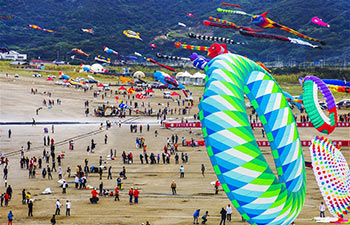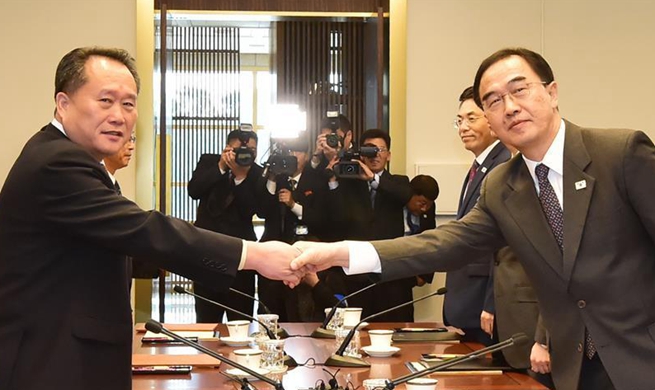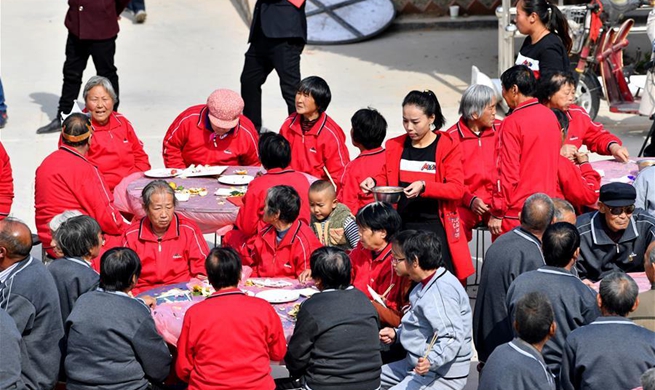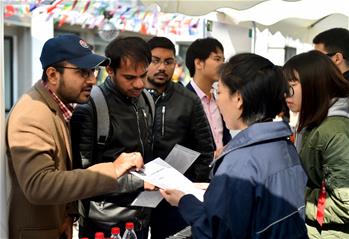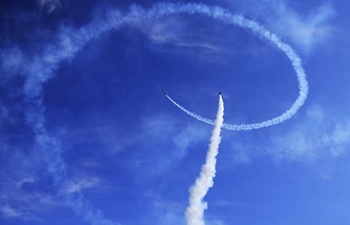by Raul Menchaca
HAVANA, Oct. 15 (Xinhua) -- No longer a social stigma associated with prisoners and other marginalized people, tattoos have gained popularity in Cuba, as a visit to the island's first professional tattoo studio shows.
Founded four years ago in the heart of Old Havana by tattoo artist Leo Canosa, La Marca (The Brand) aims to elevate tattooing to a high art form.
"Our goal is to try to make people see that tattooing is just another form of artistic expression. The only difference is that instead of canvas or paper, the art is placed on the skin," Canosa told Xinhua as he tattooed a butterfly on a young woman's ankle.
Almost all the tattoo artists at La Marca graduated from art schools, so they can create unique tailored designs without resorting to catalogs.
At Cuba's first tattoo festival recently, David Lopez, who works at the studio, won first prize in the "American Old School" category, "a very simple style with solid lines, simple color solutions and a very primitive chiaroscuro."
Canosa and his wife opened the studio at their home when government reforms encouraged the establishment of small businesses.
A steep spiral staircase leads to the second floor of the studio, where three black-leather folding chairs accommodate clients and music plays in the background, from hard rock to traditional Cuban "sones."
"Designs that reflect Cuban identity are the most popular," said Canosa, who is recognized as a disciple of famed Canadian tattoo artist John "The Dutchman" Van'T Hullenaar.
Canosa drew his first tattoo in 1995 on the right shoulder of his uncle, the late renowned Cuban painter Vicente Rodriguez Bonachea.
Today, that design serves as the logo of La Marca, which has drawn personalities such as Mexican tattoo artist Dr. Lakra and Catalan photojournalist Edu Bayer, who exhibited his collection "Marcados."
Currently, young Mexican artist Jeannine Santana is working at La Marca, exchanging trade secrets and techniques with her Cuban colleagues.
The tattoo artists have had to overcome a lack of materials in the country by buying them abroad or importing them under strict customs regulations, which raises the studio's costs, though prices in Cuba are generally lower than elsewhere.
Tattoos are equally popular among men and women, said Canosa, who is preparing to attend a tattoo convention in central Mexico with his team. They plan to showcase their designs there as they have in other cites, from Las Vegas to Miami, Vancouver and Toronto.
La Marca promotes more than just tattoos. Four times a year, the studio organizes design, photography or painting exhibits, drawing tattoos at the openings that have been conceived by recognized Cuban authors.
Its founders also offer children in the neighborhood workshops on art appreciation, lectures on recycling and even math classes for those lagging behind in school.
Though small, the business aspires to make a large contribution to the local community.




